英语泛读课后问题
英语泛读教程第二版第一册课后练习题含答案

英语泛读教程第二版第一册课后练习题含答案前言英语泛读教程是一套从零基础开始的英语教材,旨在帮助学生全面提升英语语言能力。
本文主要针对第二版第一册的课后练习题进行详细的解析和答案。
希望通过本文的学习,能够帮助同学们更好地掌握英语泛读。
第一章预读1. What is the mn idea of the passage?The mn idea of the passage is that new discoveries in genetics are providing more insight into the causes of some of the world’s most devastating diseases.2. What is the difference between genetic testing and genetic modification?Genetic testing is the process of studying anindividual’s DNA to determine if they are at risk of certn diseases. Genetic modification is the process of altering an organism’s DNA to achieve a desired trt.3. Why is genetic counseling important?Genetic counseling is important because it provides individuals with information about their risk of certndiseases and helps them make informed decisions about their health and future.4. What is the significance of the Human Genome Project?The Human Genome Project was a groundbreaking effort to map the entire human genome and has provided researchers witha wealth of information about the genetic basis of disease.5. What are some of the potential ethical concerns surrounding genetics research?Some potential ethical concerns surrounding genetics research include privacy concerns related to genetic information, the possibility of discrimination based on genetic trts, and the implications of genetic modification.第二章浏览1. What is the mn idea of the passage?The mn idea of the passage is that sleep is an essential aspect of human health and that chronic sleep deprivation can have serious negative effects on the body and mind.2. What are some of the common causes of sleep deprivation?Some common causes of sleep deprivation include work demands, parenting responsibilities, technology use, and medical conditions such as sleep apnea.3. What are some of the negative effects of sleep deprivation?Some negative effects of sleep deprivation include impred cognitive function, decreased immunity, heightened risk of mood disorders, and increased risk of chronic healthconditions such as obesity and diabetes.4. How can individuals promote healthy sleep habits?Individuals can promote healthy sleep habits byestablishing a consistent sleep routine, creating a relaxing sleep environment, limiting technology use before bed, and managing stress levels.5. What are some of the benefits of adequate sleep?Some benefits of adequate sleep include improved cognitive function, increased immunity, better mood regulation, and reduced risk of chronic illness.第三章阅读1. What is the mn idea of the passage?The mn idea of the passage is that climate change is a global issue that requires immediate action to address.2. What are some of the causes of climate change?Some causes of climate change include excessiveconsumption of fossil fuels, deforestation, agricultural practices, and industrial activity.3. What are some of the negative effects of climate change?Some negative effects of climate change include rising sea levels, more frequent natural disasters, water scarcity, and increased risk of disease.4. What are some of the potential solutions to climate change?Some potential solutions to climate change include transitioning to renewable energy sources, implementing sustnable agricultural practices, and promoting conservation efforts.5. What is the significance of the Paris Agreement?The Paris Agreement is a global effort to address climate change by setting targets for reducing greenhouse gas emissions. It represents a crucial step towards mitigating the effects of climate change and preserving the planet for future generations.结语英语泛读教程第二版第一册课后练习题的答案在本文中详细解析,希望对同学们的英语学习有所帮助。
大学英语泛读2课后答案蔡基刚

大学英语泛读2课后答案蔡基刚1. On ______, my mother earns 5000 yuan a month. [单选题] *A) totalB) average(正确答案)C) wholeD) balance2. Hourly output by workers ______ 1.3% in the first quarter. [单选题] *A) declined(正确答案)B) felledC) slowedD) reduced3. The boy acted ________ he didn’t know me. [单选题] *A. so thatB. such asC. as if(正确答案)D. as soon4. The ______ between rich and poor is getting bigger and bigger in some places. [单选题] *A) differenceB) gap(正确答案)C) variationD) hole5. There are good opportunities to learn skills ________ the job. [单选题] *A) inB) aboveC) atD) on(正确答案)6. Each key on the board is ________ a different type of function. [单选题] *A) asB) for(正确答案)C) toD) with7. The country is suffering from a ________ of food. [单选题] *A) povertyB) zeroC) lackingD) shortage(正确答案)8. You need to place the carton of fries with the McDonald’s name ________ the customer.[单选题] *A) to faceB) faceC) facing(正确答案)D) faced9. We became friends quite ________ accident. [单选题] *A) inB) out ofC) atD) by(正确答案)10. Hardly had I got to the cinema ________ the film began. [单选题] *A) when(正确答案)B) beforeC) afterD) then11. When it comes to ________, I’m best at preparing fish. [单选题] *A) cookerB) cookedC) cooking(正确答案)D) cook12. Do you think the film is worth ________? [单选题] *A) seeB) seeing(正确答案)C) to seeD) seen13. The staff in the kitchen has ________ the message that a customer wanted a special dish. [单选题] *A) received(正确答案)B) orderedC) pointedD) accepted14. ________ a sense, he may be right to say that. [单选题] *A) ForB) In(正确答案)C) AtD) Without15. Natural foods also ________ vegetables not nourished by chemical fertilizers. [单选题] *A) haveB) include(正确答案)C) removeD) contain16. The teacher was by what the student said. [单选题] *A) confusingB) confused(正确答案)C) confusion17. The food price is very frustrating. [单选题] *A) rising(正确答案)B) riseC) risen18. His father is an eye . [单选题] *A) specializeB) specialC) specialist(正确答案)19. The government did its best to encourage . [单选题] *A) investment(正确答案)B) investC) investor20. I’ve had no to my letter. [单选题] *A) responsiveB) respondC) response(正确答案)21. My sister is in charge of the of births. [单选题] *A) registration(正确答案)B) registerC) registered22. The police found out about the deaths of the three men . [单选题] *A) accidentalB) accidentally(正确答案)C) accident23. If you want to go to the concert, you’ll have to make a , or there will be no tickets. [单选题] *A) reserveB) reservedC) reservation(正确答案)24. His mother has a great from her injury. [单选题] *A) recovery(正确答案)B) recoveredC) recover25. We put up pictures and other in the classroom. [单选题] *A) decoratesB) decorativeC) decorations(正确答案)26. The government required that the factory be closed to make sure that thetourist attraction would not be polluted.[单选题] *A) 政府要求关闭那个景点以确保游客不受伤害。
大学英语泛读 第三版 第二册 (张砚秋 著) 外研社 课后答案 泛读1答案Unit1-2
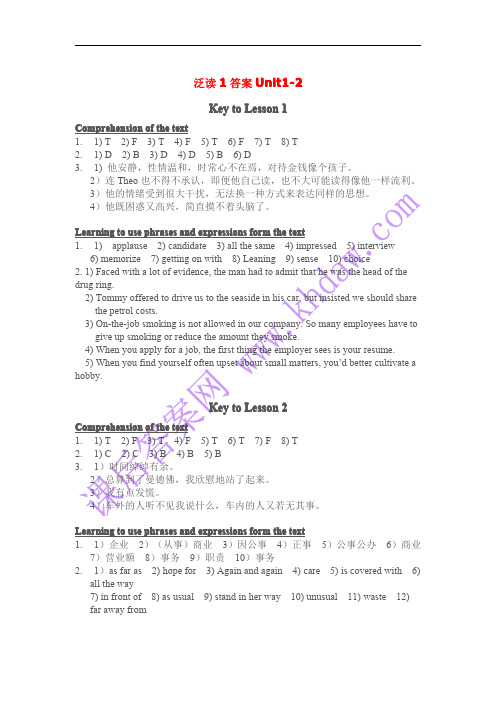
泛读1答案Unit1-2Key to Lesson11.1)T2)F3)T4)F5)T6)F7)T8)T2.1)D2)B3)D4)D5)B6)D3.1)他安静,性情温和,时常心不在焉,对待金钱像个孩子。
2)连Theo也不得不承认,即便他自己读,也不大可能读得像他一样流利。
3)他的情绪受到很大干扰,无法换一种方式来表达同样的思想。
4)他既困惑又高兴,简直摸不着头脑了。
interviewchoiceof theshould sharehave tocultivate a Learning to use phrases and expressions form the text1.1)企业2)(从事)商业3)因公事4)正事5)公事公办6)商业7)营业额8)事务9)职责10)事务2.1)as far as2)hope for3)Again and again4)care5)is covered with6)all the way7)in front of8)as usual9)stand in her way10)unusual11)waste12)far away from1.1)T2)F3)F4)T5)F6)T7)F8)T2.1)D2)B3)A4)D5)C3.1)我看他快气疯了。
2)然后他说:“你等着瞧吧,有你好看的。
”3)我的两只箱子也给我带来了不少麻烦。
Learning to use phrases and expressions form the text1.1)got hot2)at the end of3)taken the place of4)made so much noise5)at the same time6)get through7)in the air8)look through9)made signs10)lost the hope of2.1)above2)over3)through4)out of5)about6)next to7)in8)at40英里7)follow4)The German base from which they had been attacked lay about sixty kilometersto the west of the front line.5)Although being early may mean wasting a little time,this will be less than ifyou miss the train and have to wait an hour or more for the next one.6)I had been told that the hotel was not beautiful but you were better fed therethan in any other place in London;---and that was what I wanted then.1.1)T2)T3)F4)F5)F6)F7)T8)T2.1)C2)D3)C4)D5)A6)A3.1)风把我的帽子吹到路上,我跑下了人行道去捡了回来。
大学英语泛读第三版第四册课后答案主编张砚秋(完整版)

大学英语泛读第三版第四册课后答案主编张砚秋(完整版)Text 1 Words that Work Miracles1.FFTTFFFT2.DBDAAC (P4)3.translate the following sentences into Chinese (P5)1)Yet we must bask in the warmth of approval now and then or lose our self-confidence.可是我们都要时常享受到热情地赞美,否则我们就会失去自信。
2) When we are proud of our self-image,we feel confident and free to be ourselves.当我们对自身的形象感到骄傲时,会有自信心,感觉很自在。
3) A new minister called to a church jokingly referred to as "therefrigerator",decided against criticizing his congregation for its coolnesstoward strangers.Instead,he beban welcoming visitors from the pulpitand telling his flock how friendly they were.一位牧师到一座教堂上任,这座教堂被开玩笑地称作“冰箱”,他没有批评教堂的教徒们对陌生人冷漠,而是站在讲坛上欢迎来访者,并对大家说他们是多么的友善。
4) Coming home after a hard day's work ,the man who sees the faces ofhis children pressed against the window,watching for him,can water hissoul with their silent but golden opinion.经过一天的劳累,一位父亲回到家,看到孩子们把小脸贴在玻璃窗上等他回家,然而珍贵的赞美滋润了他的心田。
大学英语泛读教程2unit1课文翻译及课后小题

大学英语泛读教程2unit1课文翻译及课后小题1.The Pickle JarAs far back as I can remember, the large pickle jar sat on the floor beside the dresser in my parents' bedroom. When he got ready for bed, Dad would empty his pockets and toss his coins into the jar. As a small boy I was always fascinated at the sounds the coins made as they were dropped into the jar. They landed with a merry jingle when the jar was almost empty. Then the tones gradually muted to a dull thud as the jar was filled. I used to squat on the floor in front of the jar and admire the copper and silver circles that glinted like a pirate's treasure when the sun poured through the bedroom window.When the jar was filled, Dad would sit at the kitchen table and roll the coins before taking them to the bank. Taking the coins to the bank was always a big production. Stacked neatly in a small cardboard box, the coins were placed between Dad and me on the seat of his old truck. Each and every time, as we drove to the bank, Dad would look at me hopefully. "Those coins are going to keep you out of the textile mill, son. You're going to do better than me. This old mill town's not going to hold you back." Also, each and every time, as he slid the box of rolled coins across the counter at the bank toward the cashier, he would grin proudly. "These are for my son's college fund. He'll never work at the mill all his life like me."We would always celebrate each deposit by stopping for an ice cream cone. I always got chocolate. Dad always got vanilla. When the clerk at the ice cream parlor handed Dad his change, he would show me the few coins nestled in his palm. "When we get home, we'll start filling the jar again."He always let me drop the first coins into the empty jar. As they rattled around with a brief, happy jingle, we grinned at each other. "You'll get to college on pennies, nickels, dimes and quarters," he said. "But you'll get there. I'll see to that."The years passed, and I finished college and took a job in another town. Once, while visiting my parents, I used the phone in their bedroom, and noticed that the pickle jar was gone. It had served its purpose and had been removed. A lump rose in my throat as I stared at the spot beside the dresser where the jar had always stood. My dad was a man of few words, and never lectured me on the values of determination, perseverance, and faith. The pickle jar had taught me all these virtues far more eloquently than the most flowery of words could have done.When I married, I told my wife Susan about the significant part the lowly pickle jar had played in my life as a boy. In my mind, it defined, more than anything else, how much my dad had loved me. No matter how rough things got at home, Dad continued to doggedly drop his coins into the jar. Even the summer when Dad got laid off from the mill, and Mama had to serve dried beans several times a week, not a single dime was taken from the jar. To the contrary, as Dad looked across the table at me, pouring catsup over my beans to make them more palatable, he became more determined than ever to make a way out for me. "When you finish college, son," he told me, his eyes glistening, "You’ll never have to eat beans again unless you want to." The first Christmas after our daughter Jessica was born, we spent the holiday with my parents. After dinner, Mom and Dad sat next to each other on the sofa, taking turns cuddling their first grandchild. Jessica began to whimper softly, and Susan took her from Dad's arms. "She probably needs to be changed," she said,carrying the baby into my parents' bedroom to diaper her.When Susan came back into the living room, there was a strange mist in her eyes. She handed Jessica back to Dad before taking my hand and quietly leading me into the room."Look," she said softly, her eyes directing me to a spot on the floor beside the dresser. To my amazement, there, as if it had never been removed, stood the old pickle jar, the bottom already covered with coins.I walked over to the pickle jar, dug down into my pocket, and pulled out a fistful of coins. With a gamut of emotions choking me, I dropped the coins into the jar. I looked up and saw that Dad, carrying Jessica, had slipped quietly into the room. Our eyes locked, and I knew he was feeling the same emotions I felt. Neither one of us could speak.Exercises1. Read the following statements and decide whether they are true (T) or false (F) according to the text.1.The sounds which the coins made as they were dropped into the pickle jar greatlyinterested the narrator. ( )2.Before taking them to the bank, the father would ask his son to count the coins.( )3.The Father was a bit ashamed each time he slid the box of rolled coins across thecounter at the bank. ( )4.After each deposit, the narrator would ask his father to buy him a vanilla icecream cone. ( )5.After graduation from college, the narrator worked inanother town. ( )6.The narrator felt that he had learned the values of determination, perseverance andfaith from the pickle jar. ( )7.From what his father did, the narrator could feel his great love for him. ( )8.The narrator and his wife spent the first Christmas after their marriage with hisparents. ( )9.Puzzled by what she saw, the narrator’s wife led him into his parents’ bedroom.( )10.The narrator dropped a fistful of coins into the jar in return for his father’s love forhim. ( )2.Choose the best answer to each of the following questions based on theinformation of the text.1.When the narrator was young, ___________.A)he used to toss all the coins he had into a pickle jarB)he used to like making sounds by dropping coins into a pickle jarC)his father used to save all the coins he hadD)his father used to give him all the coins he had2.By depositing the coins in the bank, the father was determined that ______.A)he would teach his son the virtue of thriftB)he would leave as much money as possible to his sonC)his family would be better off in the futureD)his son would go to college and live a better life3.The narrator felt ______ as he stared at the place where the jar had always stood.A)strangeB)puzzledC)movedD)embarrassed4.It can be inferred from the passage that when the narrator was young, _____.A)his family was very poorB)his father was more determined than his motherC)his mother liked to serve dried beans for the familyD)he did very well in his studies5.The narrator was amazed and moved to find that ________.A)the old pickle jar had never been removedB)his father had never stopped depositing moneyC)the old pickle jar was filled with coinsD)his father had started to save money for his baby daughter咸菜坛子在我的记忆中,那个大泡菜坛子就放在父母卧室梳妆台旁边的地板上。
大学英语泛读an uncertain future课后答案

大学英语泛读an uncertain future课后答案1、My friends will _______ me at the airport when I arrive in London. [单选题] *A. takeB. meet(正确答案)C. receiveD. have2、English is very important in our daily life. Never _______. [单选题] *A. give up itB. give it up(正确答案)C. give away itD. give it away3、My father?is _______ flowers. [单选题] *A. busy watering(正确答案)B. busy waterC. busy with wateringD. busy with water4、2.I think Game of Thrones is ________ TV series of the year. [单选题] * A.excitingB.more excitingC.most excitingD.the most exciting (正确答案)5、You can _______ Bus 116 to get there. [单选题] *A. byB. take(正确答案)C. onD. in6、No writer will be considered()of the name until he writes a work. [单选题] *A. worthlessB. worthy(正确答案)C. worthwhileD. worth7、The green shorts are _______ sale for $[单选题] *A. forB. on(正确答案)C. atD. with8、28.The question is very difficult. ______ can answer it. [单选题] *A.EveryoneB.No one(正确答案)C.SomeoneD.Anyone9、My mother and my aunt are both _______. They work in a big supermarket. [单选题] *A. actressesB. doctorsC. salesmenD. saleswomen(正确答案)10、You should take the medicine after you read the _______. [单选题] *A. linesB. wordsC. instructions(正确答案)D. suggestions11、He has grown rich lately. [单选题] *A. 后来B. 以后C. 终于D. 最近(正确答案)12、7.—I've got some ________.—Great! I'd like to write with it. [单选题] *A.funB.chalk(正确答案)C.waterD.time13、When Max rushed to the classroom, his classmates _____ exercises attentively. [单选题] *A. didB. have doneC. were doing(正确答案)D. do14、We can’t go out ______ school nights. ()[单选题] *A. inB. on(正确答案)C. atD. by15、Jane and Tom _______ my friends. [单选题] *A. amB. isC. are(正确答案)D. was16、She _______ be here. [单选题] *A. is gladB. is so glad to(正确答案)C. am gladD. is to17、____ wants to see you. [单选题] *A. Somebody(正确答案)B. AnybodyC. All the peopleD. No people18、The manager demanded that all employees _____ on time. [单选题] *A. be(正确答案)B. areC. to beD. would be19、It was difficult to guess what her_____to the news would be. [单选题] *A.impressionmentC.reaction(正确答案)D.opinion20、John and Jack had looked for the key, but _____ of them found it. [单选题] *A. noneB. neither(正确答案)C. bothD. either21、Though the _____ drama is wonderful, I guess most audiences will be tired as it is too long. [单选题] *A. four-hour(正确答案)B. four hoursC. four-hoursD. four-hour's22、( ). The old man enjoys ______ stamps. And now he has1300 of them [单选题] *A. collectB. collectedC. collecting(正确答案)D. to collect23、Mom is making dinner. It _______ so nice! [单选题] *A. smells(正确答案)B. tastesC. feelsD. sounds24、The young man had decided to give up the chance of studying abroad, _____ surprised his parents a lot. [单选题] *A. whenB. whereC. which(正确答案)D. that25、If you do the same thing for a long time, you'll be tired of it. [单选题] *A. 试图B. 努力C. 厌倦(正确答案)D. 熟练26、The work will be finished _______ this month. [单选题] *A. at the endB. in the endC. by the endD. at the end of(正确答案)27、At nine yesterday morning, I ______ an English class while they ______ a PE class.()[单选题] *A. was having; were having(正确答案)B. had; hadC. was having; hadD. had; were having28、14.Builders have pulled down many old houses, and they will build a lot of new ________. [单选题] *A.ones (正确答案)B.oneC.the onesD.the one29、It is reported that the fire caused serious()to that school building. [单选题] *A. damage(正确答案)B. destroyC. harmD.hurt30、______! It’s not the end of the world. Let’s try it again.()[单选题] *A. Put upB. Set upC. Cheer up(正确答案)D. Pick up。
泛读三课后练习答案
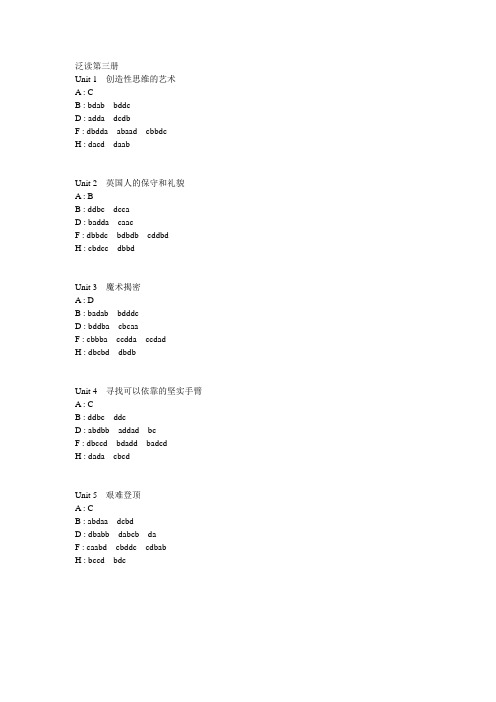
泛读第三册Unit 1 创造性思维的艺术A : CB : bdab bddcD : adda dcdbF : dbdda abaad cbbdcH : dacd daabUnit 2 英国人的保守和礼貌A : BB : ddbc dccaD : badda caacF : dbbdc bdbdb cddbdH : cbdcc dbbdUnit 3 魔术揭密A : DB : badab bdddcD : bddba cbcaaF : cbbba ccdda ccdadH : dbcbd dbdbUnit 4 寻找可以依靠的坚实手臂A : CB : ddbc ddcD : abdbb addad bcF : dbccd bdadd badcdH : dada cbcdUnit 5 艰难登顶A : CB : abdaa dcbdD : dbabb dabcb daF : caabd cbddc cdbabH : bccd bdcUnit 6 药对了,病人错了A : BB : cbcab ddadD : badaa cbaac abF : cabcd aadcb ccdabH : ccdc dabcUnit 7 自己的房间A : DB : acbda dcaacD : abaac daccd adF : daada cddbc bdcdbH : cbadb cddbcUnit 8 假如我有三天光阴A : CB : cddcc dccbD : abda caaaF : ccacd bbdad babddH : dbdbc cbcdUnit 9 梦与睡眠一样重要吗A : CB : bccbc dbbaD : dcbab dacbacF : dcbca bccbc bcdddH : dcdc abdUnit 10 诚信原则A : CB : cdccd bacacD : dcdbc acadc bdF : dbdcc dccdb bddcaH : cadcb acbbUnit 11 非语言交际A : DB : adac cdcbD : abacb dcaab adcF : dcdab ccbda ccbcaH : bcadb bcdddUnit 12 你为何如此聪明A : BB : bbbd dcccD : cdccd acdba dcaF : bbddc dbdbc cdcddH : bcdcc badbbcUnit 13 道德,猿和我们A : AB : cdca dbabD : cbada cabdbF : cdacc caccd bdbdbH : bdbc cbddUnit 14 你怎么知道艺术品的优劣A : CB : ddca ddabD : dacad babadbF : ddabb bddca dcccbH : cdcd addUnit 15 热爱生命A : CB : abbac bccdbbD :babcc aaacd bbF : caccb accdc ddadaH : cdac dddc。
大学英语泛读教程2 unit1课文翻译及课后小题
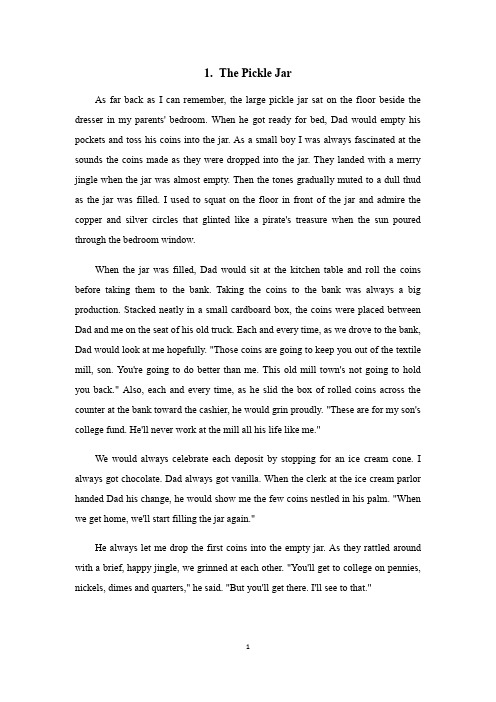
1.The Pickle JarAs far back as I can remember, the large pickle jar sat on the floor beside the dresser in my parents' bedroom. When he got ready for bed, Dad would empty his pockets and toss his coins into the jar. As a small boy I was always fascinated at the sounds the coins made as they were dropped into the jar. They landed with a merry jingle when the jar was almost empty. Then the tones gradually muted to a dull thud as the jar was filled. I used to squat on the floor in front of the jar and admire the copper and silver circles that glinted like a pirate's treasure when the sun poured through the bedroom window.When the jar was filled, Dad would sit at the kitchen table and roll the coins before taking them to the bank. Taking the coins to the bank was always a big production. Stacked neatly in a small cardboard box, the coins were placed between Dad and me on the seat of his old truck. Each and every time, as we drove to the bank, Dad would look at me hopefully. "Those coins are going to keep you out of the textile mill, son. You're going to do better than me. This old mill town's not going to hold you back." Also, each and every time, as he slid the box of rolled coins across the counter at the bank toward the cashier, he would grin proudly. "These are for my son's college fund. He'll never work at the mill all his life like me."We would always celebrate each deposit by stopping for an ice cream cone. I always got chocolate. Dad always got vanilla. When the clerk at the ice cream parlor handed Dad his change, he would show me the few coins nestled in his palm. "When we get home, we'll start filling the jar again."He always let me drop the first coins into the empty jar. As they rattled around with a brief, happy jingle, we grinned at each other. "You'll get to college on pennies, nickels, dimes and quarters," he said. "But you'll get there. I'll see to that."The years passed, and I finished college and took a job in another town. Once, while visiting my parents, I used the phone in their bedroom, and noticed that the pickle jar was gone. It had served its purpose and had been removed. A lump rose in my throat as I stared at the spot beside the dresser where the jar had always stood. My dad was a man of few words, and never lectured me on the values of determination, perseverance, and faith. The pickle jar had taught me all these virtues far more eloquently than the most flowery of words could have done.When I married, I told my wife Susan about the significant part the lowly pickle jar had played in my life as a boy. In my mind, it defined, more than anything else, how much my dad had loved me. No matter how rough things got at home, Dad continued to doggedly drop his coins into the jar. Even the summer when Dad got laid off from the mill, and Mama had to serve dried beans several times a week, not a single dime was taken from the jar. To the contrary, as Dad looked across the table at me, pouring catsup over my beans to make them more palatable, he became more determined than ever to make a way out for me. "When you finish college, son," he told me, his eyes glistening, "You’ll never have to eat beans again unless you want to." The first Christmas after our daughter Jessica was born, we spent the holiday with my parents. After dinner, Mom and Dad sat next to each other on the sofa, taking turns cuddling their first grandchild. Jessica began to whimper softly, and Susan took her from Dad's arms. "She probably needs to be changed," she said, carrying the baby into my parents' bedroom to diaper her.When Susan came back into the living room, there was a strange mist in her eyes. She handed Jessica back to Dad before taking my hand and quietly leading me into the room."Look," she said softly, her eyes directing me to a spot on the floor beside the dresser. To my amazement, there, as if it had never been removed, stood the old pickle jar, the bottom already covered with coins.I walked over to the pickle jar, dug down into my pocket, and pulled out a fistful of coins. With a gamut of emotions choking me, I dropped the coins into the jar. I looked up and saw that Dad, carrying Jessica, had slipped quietly into the room. Our eyes locked, and I knew he was feeling the same emotions I felt. Neither one of us could speak.Exercises1. Read the following statements and decide whether they are true (T) or false (F) according to the text.1.The sounds which the coins made as they were dropped into the pickle jar greatlyinterested the narrator. ( )2.Before taking them to the bank, the father would ask his son to count the coins.( )3.The Father was a bit ashamed each time he slid the box of rolled coins across thecounter at the bank. ( )4.After each deposit, the narrator would ask his father to buy him a vanilla icecream cone. ( )5.After graduation from college, the narrator worked in another town. ( )6.The narrator felt that he had learned the values of determination, perseverance andfaith from the pickle jar. ( )7.From what his father did, the narrator could feel his great love for him. ( )8.The narrator and his wife spent the first Christmas after their marriage with hisparents. ( )9.Puzzled by what she saw, the narrator’s wife led him into his parents’ bedroom.( )10.The narrator dropped a fistful of coins into the jar in return for his father’s love forhim. ( )2.Choose the best answer to each of the following questions based on theinformation of the text.1.When the narrator was young, ___________.A)he used to toss all the coins he had into a pickle jarB)he used to like making sounds by dropping coins into a pickle jarC)his father used to save all the coins he hadD)his father used to give him all the coins he had2.By depositing the coins in the bank, the father was determined that ______.A)he would teach his son the virtue of thriftB)he would leave as much money as possible to his sonC)his family would be better off in the futureD)his son would go to college and live a better life3.The narrator felt ______ as he stared at the place where the jar had always stood.A)strangeB)puzzledC)movedD)embarrassed4.It can be inferred from the passage that when the narrator was young, _____.A)his family was very poorB)his father was more determined than his motherC)his mother liked to serve dried beans for the familyD)he did very well in his studies5.The narrator was amazed and moved to find that ________.A)the old pickle jar had never been removedB)his father had never stopped depositing moneyC)the old pickle jar was filled with coinsD)his father had started to save money for his baby daughter咸菜坛子在我的记忆中,那个大泡菜坛子就放在父母卧室梳妆台旁边的地板上。
英语泛读教程4课后答案
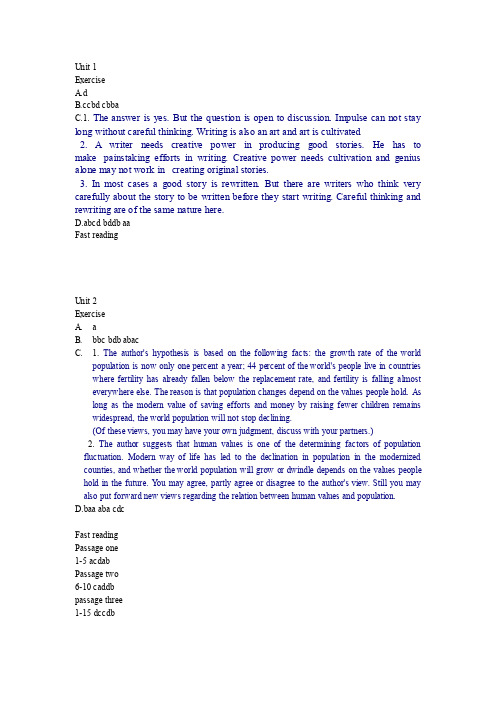
ExerciseA.dbd cbbaC.1. The answer is yes. But the question is open to discussion. Impulse can not stay long without careful thinking. Writing is also an art and art is cultivated2. A writer needs creative power in producing good stories. He has to make painstaking efforts in writing. Creative power needs cultivation and genius alone may not work in creating original stories.3. In most cases a good story is rewritten. But there are writers who think very carefully about the story to be written before they start writing. Careful thinking and rewriting are of the same nature here.D.abcd bddb aaFast readingUnit 2ExerciseA. aB.bbc bdb abacC. 1.The author's hypothesis is based on the following facts: the growth rate of the worldpopulation is now only one percent a year; 44 percent of the world's people live in countries where fertility has already fallen below the replacement rate, and fertility is falling almost everywhere else. The reason is that population changes depend on the values people hold. As long as the modern value of saving efforts and money by raising fewer children remains widespread, the world population will not stop declining.(Of these views, you may have your own judgment, discuss with your partners.)2.The author suggests that human values is one of the determining factors of population fluctuation. Modern way of life has led to the declination in population in the modernized counties, and whether the world population will grow or dwindle depends on the values people hold in the future. Y ou may agree, partly agree or disagree to the author's view. Still you may also put forward new views regarding the relation between human values and population.D.baa aba cdcFast readingPassage one1-5 acdabPassage two6-10 caddbpassage three1-15 dccdbExerciseA.aB.b ab cdb abbC.1. Genetically modified food is made from crops and vegetables genetically changed by scientists. GM food has aroused great dissentions among governments, scientists, farmers, and consumers. On one hand are the high quality crops due to the gene technique, on the other hand are the potential risks.(While giving your ideas, consider the interests of different peoples.)3. From the text we can see that the food fight between the U.S. and the E. U. comes as muchfrom the concern for their own interests as from safety considerations. While the E. U. banned the non-proved GM food from the U.S., France is still churning out GM crops. Anyway, it shows that people are more alert to the potential dangers of the GM food. (Y our comments can be positive or negative. Consider that while the consumers' attitudes determine the popularity of the GM food, the government, scientific research, media propaganda and other factors can influence the consumers' decisions.)D.aad bac cad bcc adFast readingPassage one1-5 cbbabPassage two6-10 badbbPassage three11-15 bbdadUnit 5ExerciseA. aB.bcadb caC. 1. It doesn't take a genius to work out why advertisers try hard to market directly to children.British children aged four to fourteen spend an average of £2.49 each week. This makes the pocket money market worth more than £1.5 billion a year, according to a recent report from management consultancy Datamonitor. In the US the pocket money market is worth a massive $64 billion a year. Selling to children has become big business.2.Many measures have been taken to achieve this purpose. For example, Winthrop Publications in London has just launched the International Journal of Advertising and Marketing to Children. One article reports that 60 per cent of children aged two to eleven know by the end of October what they want for Christmas, and that for girls under seven the biggest deciding factor is what they see on television.Conferences and consultancies abound. Pay£2000 and you can attend Kid Power 99 at anyone of a string of European venues. The meetings offer workshops on "what works with kids and why", "peer group1 marketing" and how to "think like a kid". Consultancy firms will tell you how to build "a wall of communication" to influence "your core consumer lifestyle" from the moment said consumer is two years old.3. From psychologist's experiments about children's response to ads, we can learn that children are not as gullible as they are thought to be. They become more cynical and sophisticated. Children are "brand literate" and they can see through "marketing hyperbole". Either children are getting wise to the advertising game, and at an earlier age than in the 1970s and 1980s, or in the past psychologists underestimated their young subjects' ability to work out other people's motivation.From article reports we know that 60 per cent of children aged two to ele ven know by the end of October know what they want for Christmas, and that for girls under seven the biggest deciding factor is what they see on television. Children are notoriously fickle, and advertisers have a hard job keeping up with their capricious t astes. Children are aware of the purpose of ads, those aimed children are no more sinister than those aimed at adults.D.dcdab abdad bcaFast readingPassage one1-5 bcacdPassage two6-10 acbdcPassage three11-15 accccUnit 6ExerciseA. aB.bdaac bcdC. 1.Feedback shows that important student needs are being satisfied by the Internet. Websites provide information, support and encouragement when parents aren't around; students having difficulties in particular subjects can choose their own pace, away from the classroom, to study examples, tests and explanations on the web; students who are missing school through illness can keep up. Many students say that websites provide better resources and support in the lead-up to exams than their weaker teachers.2. No. Revision sites can't totally replace traditional school functions. For example, schoolsdo more than just inform and train. Traditional schools do quite a bit in shaping the soundcharacter of the students. (Open to discussion.)D.dcaad cddba bcFast readingPassage one1-5 cadbaPassage two6-10 bcdabPassage three11-15 bdacc。
英语泛读教程2第三版课后答案
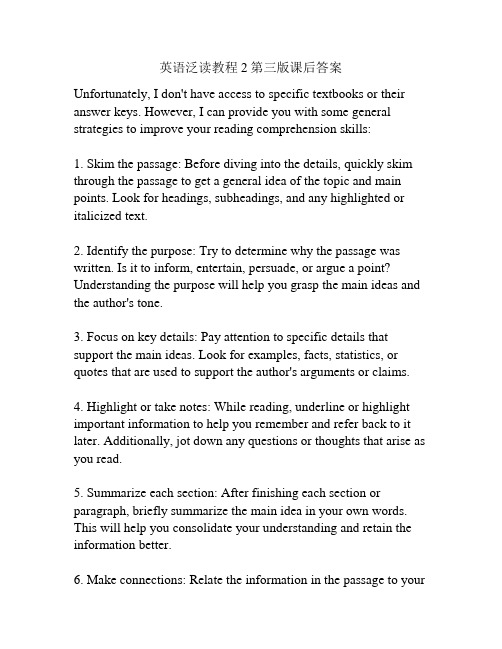
英语泛读教程2第三版课后答案Unfortunately, I don't have access to specific textbooks or their answer keys. However, I can provide you with some general strategies to improve your reading comprehension skills:1. Skim the passage: Before diving into the details, quickly skim through the passage to get a general idea of the topic and main points. Look for headings, subheadings, and any highlighted or italicized text.2. Identify the purpose: Try to determine why the passage was written. Is it to inform, entertain, persuade, or argue a point? Understanding the purpose will help you grasp the main ideas and the author's tone.3. Focus on key details: Pay attention to specific details that support the main ideas. Look for examples, facts, statistics, or quotes that are used to support the author's arguments or claims.4. Highlight or take notes: While reading, underline or highlight important information to help you remember and refer back to it later. Additionally, jot down any questions or thoughts that arise as you read.5. Summarize each section: After finishing each section or paragraph, briefly summarize the main idea in your own words. This will help you consolidate your understanding and retain the information better.6. Make connections: Relate the information in the passage to yourown experiences, prior knowledge, or other readings you have done. Connecting new information to existing knowledge can enhance comprehension.7. Practice active reading: Engage with the text by asking questions, making predictions, and forming opinions as you read. This will keep you actively involved and help you understand the material more deeply.Remember that effective reading comprehension takes practice and patience. Regularly challenge yourself with a variety of texts from different genres to improve your overall reading skills.。
英语泛读教程4第二版unit3 globalization课后答案
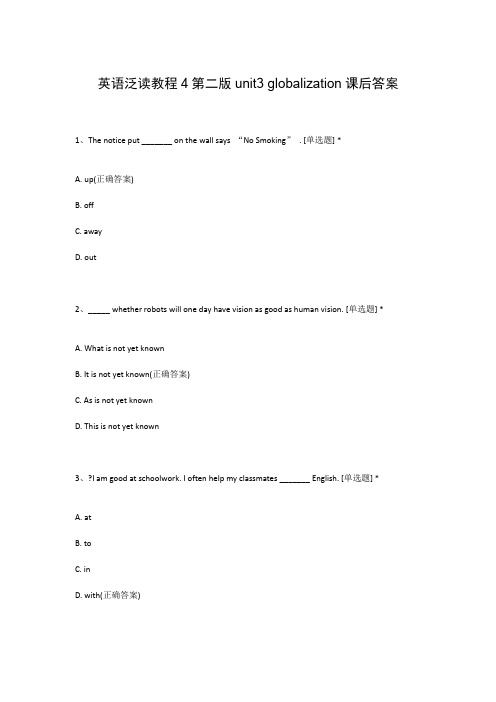
英语泛读教程4第二版unit3 globalization课后答案1、The notice put _______ on the wall says “No Smoking”. [单选题] *A. up(正确答案)B. offC. awayD. out2、_____ whether robots will one day have vision as good as human vision. [单选题] *A. What is not yet knownB. It is not yet known(正确答案)C. As is not yet knownD. This is not yet known3、?I am good at schoolwork. I often help my classmates _______ English. [单选题] *A. atB. toC. inD. with(正确答案)4、Tom sits _______ Mary and Jane. [单选题] *A. amongB. between(正确答案)C. onD. next5、The manager isn’t in at the moment. May I _______ a message? [单选题] *A. take(正确答案)B. makeC. haveD. keep6、These oranges look nice, but _______ very sour. [单选题] *A. feelB. taste(正确答案)C. soundD. look7、—Why do you look so ______?—Our team won the basketball match!()[单选题] *A. angryB. excited(正确答案)C. nervousD. unfair8、—______some nice crayons. I think they are ______.()[单选题] *A. Here is; Betty’sB. Here are; BettyC. Here is; BettyD. Here are; Betty’s(正确答案)9、—______is my notebook?—Look! It’s in your schoolbag.()[单选题] *A. WhatB. WhichC. Where(正确答案)D. How10、We must try hard to make up for the lost time. [单选题] *A. 弥补(正确答案)B. 利用C. 抓紧D. 浪费11、You wouldn' t have caught such ____ bad cold if you hadn' t been caught in ____?rain. [单选题] *A. a, /B. a, aC. a,the(正确答案)D. /, /12、If you don’t feel well, you’d better ask a ______ for help. [单选题] *A. policemanB. driverC. pilotD. doctor(正确答案)13、Mr. Bliss became the first person to die in a car accident. [单选题] *A. 事故(正确答案)B. 竞赛C. 检阅D. 交易14、Many children have to _______ their parents. [单选题] *A. divide intoB. put onC. depend on(正确答案)D. take on15、3.—Will you buy the black car?No, I won't. I will buya(n) ________ one because I don't have enough money. [单选题] *A.cheap(正确答案)B.expensiveC.highD.low16、21.Design a travel guide for Shanghai! ________ the competition and be the winner! [单选题] *A.JoinB.AttendC.EnterD.Take part in (正确答案)17、16.We asked ______ engineer we met before to help repair the radio yesterday. [单选题] *A.aB.anC.the(正确答案)D./18、It was difficult to guess what her_____to the news would be. [单选题] *A.impressionmentC.reaction(正确答案)D.opinion19、4.—Let's fly a kite when you are ________ at the weekend.—Good idea. [单选题] * A.warmB.kindC.smallD.free(正确答案)20、Jane and Tom _______ my friends. [单选题] *A. amB. isC. are(正确答案)D. was21、--What’s your _______, Jim Green?--Jim. [单选题] *A. full nameB. first name(正确答案)C. last nameD. family name22、____ of my parents has been to my school, so they know _____ of my classmates. [单选题] *A. Neither, none(正确答案)B. No one, noneC. None, no oneD. Neither, no one23、Mary, together with her children ,_____ some video show when I went into the sitting room. [单选题] *A. were watchingB. was watching(正确答案)C. is watchingD. are watching24、Growing vegetables()constantly watering. [单选题] *A. neededB. are neededC. were neededD. needs(正确答案)25、He spoke too fast, and we cannot follow him. [单选题] *A. 追赶B. 听懂(正确答案)C. 抓住D. 模仿26、Taking the subway is quite fast and cheap. It can _______ both time and money. [单选题] *A. savesB. save(正确答案)C. earnD. use27、The idea of working abroad really()me. [单选题] *appeals to (正确答案)B. attaches toC. adapts toD. gets across28、Jim is a(n) _______. He is very careful and likes to work with numbers. [单选题] *A. secretaryB. tour guideC. accountant(正确答案)D. English teacher29、These plastics flowers look so_____that many people think they are real. [单选题] *A.beautifulB.artificialC.natural(正确答案)D.similar30、He has two sisters but I have not _____. [单选题] *A. noneB. someC. onesD. any(正确答案)。
大学英语泛读3 unit1课后答案(1)
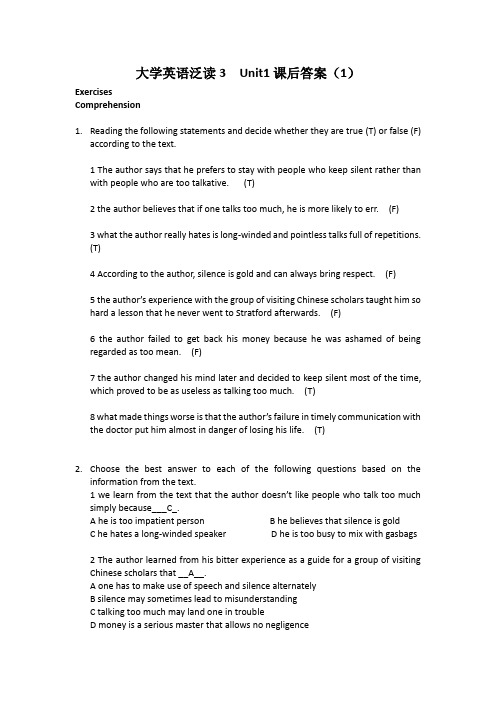
大学英语泛读3 Unit1课后答案(1)ExercisesComprehension1.Reading the following statements and decide whether they are true (T) or false (F)according to the text.1 The author says that he prefers to stay with people who keep silent rather thanwith people who are too talkative. (T)2 the author believes that if one talks too much, he is more likely to err. (F)3 what the author really hates is long-winded and pointless talks full of repetitions.(T)4 According to the author, silence is gold and can always bring respect. (F)5 the author’s experience with the group of visiting Chinese scholars taught him sohard a lesson that he never went to Stratford afterwards. (F)6 the author failed to get back his money because he was ashamed of beingregarded as too mean. (F)7 the author changed his mind later and decided to keep silent most of the time,which proved to be as useless as talking too much. (T)8 what made things worse is that the author’s failure in timely communication withthe doctor put him almost in danger of losing his life. (T)2.Choose the best answer to each of the following questions based on theinformation from the text.1 we learn from the text that the author doesn’t like people who talk too muchsimply because___C_.A he is too impatient personB he believes that silence is goldC he hates a long-winded speakerD he is too busy to mix with gasbags2 The author learned from his bitter experience as a guide for a group of visitingChinese scholars that __A__.A one has to make use of speech and silence alternatelyB silence may sometimes lead to misunderstandingC talking too much may land one in troubleD money is a serious master that allows no negligence3 By saying that trip to Stratford “was certainly the most miserable one”, the authormeans that __D_.A he didn’t gain anythingB he resented the head visitor for his abruptnessC he couldn’t satisfy the visitorsD he felt he was helplessly stupid4 The author liked the nurse better than the doctor in that _C__.A she took good care of himB she spoke less authoritativelyC she was more frank than the doctorD she saved him at the critical moment5 The author’s view on speech versus silence can be boiled down to the statementthat _A__.A speech is indispensable and silence is worthwhile sometimesB silence is important so that you won’t make others hate youC silence often results in one’s physical dangerD speech shows weakness while silence shows strength6 The author’s story was told in a _D__.A properB humorousC subtleD practical3.Translate the following sentences from the text into Chinese.1 Leaving aside such gasbags who are after all exceptions rather than the rule, westill have those people who just do not know when to “leave well alone” when they are speaking or explaining something.废话连篇的人毕竟是个例,不是惯例,我们姑且不谈他们。
英语泛读三课后习题整理
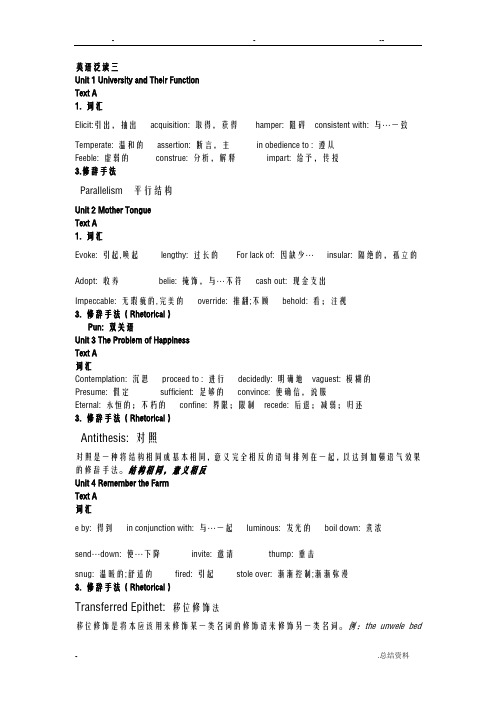
英语泛读三Unit 1 University and Their FunctionText A1. 词汇Elicit:引出,抽出acquisition: 取得,获得hamper: 阻碍consistent with: 与…一致Temperate: 温和的assertion: 断言,主in obedience to : 遵从Feeble: 虚弱的construe: 分析,解释impart: 给予,传授3.修辞手法Parallelism 平行结构Unit 2 Mother TongueText A1. 词汇Evoke: 引起,唤起lengthy: 过长的For lack of: 因缺少…insular: 隔绝的,孤立的Adopt: 收养belie: 掩饰,与…不符cash out: 现金支出Impeccable: 无瑕疵的,完美的override: 推翻;不顾behold: 看;注视3. 修辞手法(Rhetorical)Pun: 双关语Unit 3 The Problem of HappinessText A词汇Contemplation: 沉思proceed to : 进行decidedly: 明确地vaguest: 模糊的Presume: 假定sufficient: 足够的convince: 使确信,说服Eternal: 永恒的;不朽的confine: 界限;限制recede: 后退;减弱;归还3. 修辞手法(Rhetorical)Antithesis: 对照对照是一种将结构相同或基本相同,意义完全相反的语句排列在一起,以达到加强语气效果的修辞手法。
结构相同,意义相反Unit 4 Remember the FarmText A词汇e by: 得到in conjunction with: 与…一起luminous: 发光的boil down: 煮浓send…down: 使…下降invite: 邀请thump: 重击snug: 温暖的;舒适的fired: 引起stole over: 渐渐控制;渐渐弥漫3. 修辞手法(Rhetorical)Transferred Epithet: 移位修饰法移位修饰是将本应该用来修饰某一类名词的修饰语来修饰另一类名词。
大学英语泛读第三版第一册课后答案
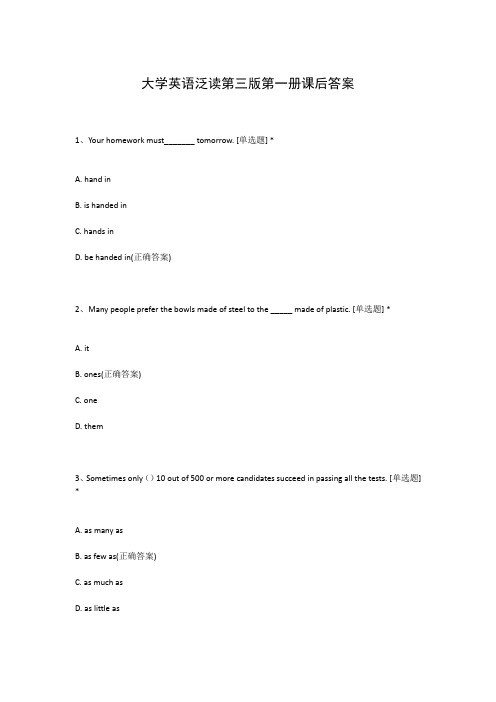
大学英语泛读第三版第一册课后答案1、Your homework must_______ tomorrow. [单选题] *A. hand inB. is handed inC. hands inD. be handed in(正确答案)2、Many people prefer the bowls made of steel to the _____ made of plastic. [单选题] *A. itB. ones(正确答案)C. oneD. them3、Sometimes only()10 out of 500 or more candidates succeed in passing all the tests. [单选题] *A. as many asB. as few as(正确答案)C. as much asD. as little as4、Patrick bought her two handbags as gifts,but _____ of them was her style. [单选题] *A. eitherB. noneC. neither(正确答案)D. all5、You can't see many _____ in a hospital. [单选题] *A. man nurseB. men nurses(正确答案)C. men nurseD. man nurses6、____ wants to see you. [单选题] *A. Somebody(正确答案)B. AnybodyC. All the peopleD. No people7、_____he was seriously ill, I wouldn’t have told him the truth. [单选题] *A.If I knewB.Had I known(正确答案)C.Did I knowD.Were I known8、Fresh _______ is good for our health. [单选题] *A. climateB. skyC. weatherD. air(正确答案)9、Our school is beautiful. How about _______? [单选题] *A. theirs(正确答案)B. theirC. theyD. them10、I am so excited to receive a _______ from my husband on my birthday. [单选题] *A. present(正确答案)B. percentC. parentD. peace11、—______ pencils are these?—They are Tony’s.()[单选题] *A. WhatB. WhereC WhoD. Whose(正确答案)12、I think you should buy this novel. It is really worth _____. [单选题] *A. reading(正确答案)B. being readC. readD. to read13、As soon as he _______, he _______ to his family. [单选题] *A. arrived, writesB. arrived, writtenC. arrived, wrote(正确答案)D. arrives, write14、Hurry up,?or we’ll _______ class. [单选题] *A. be late for(正确答案)B. late forC. late withD. be late with15、His father always _______ by subway. [单选题] *A. go to workB. go to schoolC. goes to bedD. goes to work(正确答案)16、John suggest _____ anything about it until they found out more facts. [单选题] *A not to sayB. not sayC to say notD not saying(正确答案)17、They were both born _______ March, 1 [单选题] *A. in(正确答案)B. atC. onD. since18、_______ your parents at home last week? [单选题] *A. IsB. WasC. AreD. Were(正确答案)19、He was born in Canada, but he has made China his _______. [单选题] *A. familyB. addressC. houseD. home(正确答案)20、()late for the meeting again, Jack! 一Sorry, I won t. [单选题] *A.Don’tB. Be notC.Don't be(正确答案)D.Not be21、Li Lei often takes a walk early ______ the morning.()[单选题] *A. atB. onC. in(正确答案)D. for22、1.________my father ________ my mother is able to drive a car. So they are going to buy one. [单选题] *A.Neither; norB.Both; andC.Either; orD.Not only; but also(正确答案)23、We have made a _______ tour plan to Sydney. [单选题] *A. two dayB. two daysC. two-day(正确答案)D. two-days24、16.We asked ______ engineer we met before to help repair the radio yesterday. [单选题] *A.aB.anC.the(正确答案)D./25、Almost every one of us could see her anxiety from the()on her face. [单选题] *A. appearanceB. feelingC. movementD. expression(正确答案)26、The firm attributed the accident to()fog, and no casualties have been reported until now. [单选题] *A. minimumB. scarceC. dense(正确答案)D. seldom27、Words are windows()you can look into the past. [单选题] *A. through which(正确答案)B. through thatC. whichD. whose28、You can ask()is on duty there tonight. [单选题] *A. WhatB. whomC. whoever(正确答案)D. whomever29、Which animal do you like _______, a cat, a dog or a bird? [单选题] *A. very muchB. best(正确答案)C. betterD. well30、What’s your _______ for the coming new year? [单选题] *A. playB. plantC. plan(正确答案)D. plans。
英语泛读课后习题
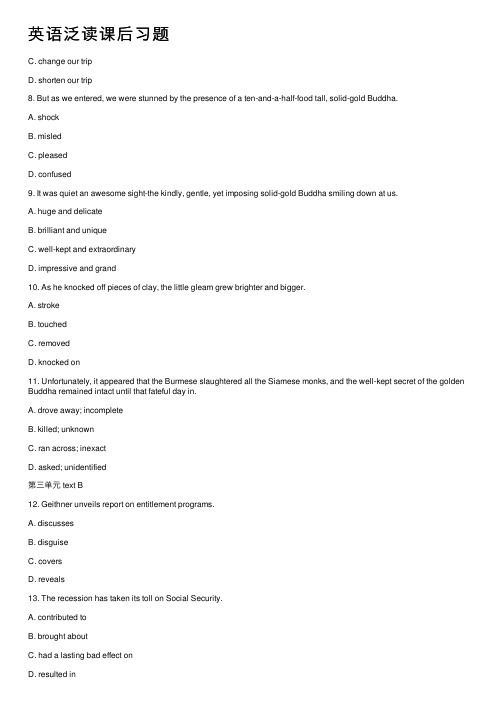
英语泛读课后习题C. change our tripD. shorten our trip8. But as we entered, we were stunned by the presence of a ten-and-a-half-food tall, solid-gold Buddha.A. shockB. misledC. pleasedD. confused9. It was quiet an awesome sight-the kindly, gentle, yet imposing solid-gold Buddha smiling down at us.A. huge and delicateB. brilliant and uniqueC. well-kept and extraordinaryD. impressive and grand10. As he knocked off pieces of clay, the little gleam grew brighter and bigger.A. strokeB. touchedC. removedD. knocked on11. Unfortunately, it appeared that the Burmese slaughtered all the Siamese monks, and the well-kept secret of the golden Buddha remained intact until that fateful day in.A. drove away; incompleteB. killed; unknownC. ran across; inexactD. asked; unidentified第三单元 text B12. Geithner unveils report on entitlement programs.A. discussesB. disguiseC. coversD. reveals13. The recession has taken its toll on Social Security.A. contributed toB. brought aboutC. had a lasting bad effect onD. resulted in14. But no one is suggesting such abrupt changes be made.A. suddenB. gradualC. drasticD. minute15. That’s why the American Academy of Actuaries is advocating that lawmakers gradually increase the age at which a person can start collecting full Social Security benefits.A. dedicatingB. sponsoringC. supportingD. opposing16. Or Medicare’s outlays would need to be reduced by 53%.A. layoutsB. expenseC. surchargesD. outputs17. Part of that burden will be relieved once the growth of health care costs is slowed.A. produced B .deduced C. induced D. reduced第四单元 text A18. Roger tried to pull his artificial leg free, but instead it ended up being pulled off.A. woundedB. man—madeC. badD. artistic19. I didn’t know what else to do so I started hopping towardsthe goal line.A. walkingB. lookingC. jumping with one legD. throwing20. But not every obstacle gave way to Roger’s determination.A. strokeB. gave in toC. gave a fightD. blew21. You can’t do everything—its better to concentrate on what you can do.B. depend onC. talk aboutD. count on22. By luck, Roger stumbled upon an odd—looking tennis racket in a sports shop and accidently wedged his finger between its double—barred handle when he picked it up.A. beautifulB. usefulC. impressiveD. strange23. But Roger persisted.A. couldn’t understandB. felt it hardC. didn’t give upD. was afraid第六单元text A24. Now, I personally think this is a pretty improper question to ask anyone, much less the husband of a victim of a terrorist attack.A. less thanB. not to mentionC. too littleD. not good to25. Of course, we would all act differently if we knew time together with our spouses was running out.A. colleagueB. relativeC. husband or wifeD. children26. I muttered to myself, switching off the television.A. moving away fromB. turning offC. changing the channel onD. covering27. With terrorists trying to cripple our nation, we wanted to show our support.A. supportB. developC. protect28. Starting the power washer was a bit tricky.A. difficultB. cunningC. boringD. tiring29. And he hears those of us who need a little boost when we have set out to do something special for someone we love.A. adviceB. blessingC. pushD. cooperation第六单元 text B30. Time and again, we were told there are too few women in the pipeline…A. inside the conduitB. ready for the jobC. in deliveryD. standing in a queue31. …that boards composed entirely of white indulged in narrow “groupthink” and were missing out on talent.A. immersedB. yieldedC. engorgedD. spoiled32. It aims to coach, mentor and train 24 female executives in the morning months —— and 100 over four years—— to try to make them “board-ready”.A. ready to become a board memberB. make cardboard availableC. ready to check inD. be on deck33. Women remain heavily under-represented in the boardroom in all developed countries, despite their substantial labor force participation rate…A. be on showB. attend few meetingsC. being displayedD. be less commonly appointed as directors34. EIRIS attributes this leading performance to the fact that senior politicians in Norway and Sweden have threatened to legislate quotas for the number of women on corporate boards…A. make adjustmentB. adoptC. make lawD. commit⼆:填词第⼀单元 text A1.People living near the airport are -------- new restrictionson night flights.2. The foreign visitors kept marveling at the --------changes that had -------- in the remote town.3. The manager was in a bad mood as his secretary had been -------- about the unfair treatment.4. With her husband laid off in the financial crisis, John feltit was hard to -------- with such a small income.5. She was careful to -------- whatever the teacher said inthe class.6. After experiencing culture shock at first, Xiao Li has-------- the exotic life in the United Kingdom.7.What we should -------- is the meaning of life rather than merely the pursuit of money.第⼆单元 text B1.--------, an expensive pair of shoes may save you money.2.My duties change -------- of my boss.3.Sudden unemployment made him -------- his villa for a smaller house.4.He’s had no end of bad luck, but he just seems to --------every time.5.Can you -------- of what this book says?6.Put the sweets on the table so that everyone can --------.7.John has --------his old car for a more expensive one.8.I think it’s time to -------- this meeting; otherwise,we’ll finish too late.9.I can’t -------- the puzzle.10.Public opinion has shifted -------- the President’s new policy.第三单元 text A1.In the 1980s, he began -------- his own haircare products.2.Tourism -------- income for local communities.3.After two hours of intense questioning, he reminded--------.4.As a young man he went off to Africa, looking for --------.5.In the last 20 years, South Korea has been -------- into a major industrial nation.6.Holyfield accepted Lewis’-------- to fight for the title.7.In the movie, the hero has to rescue the world from an-------- scientist.第五单元 text B1. Don ’t -------- too much work – the extra cash isn ’t worth it.2. Several major hospitals are -------- staff at the moment.3.Shares in the company dropped 26% yesterday, as profits -------- city expectations.4. Would it -------- for the city authorities to furtherrestrict parking?5. Mary always -------- her loan balance -------- when she hascash left over.6. The previously peaceful demonstration seemed to be --------.7. His political future -------- the outcome of this election. 第⼋单元 text A1. There are -------- changes taking place in Eastern Europe.2. The animals -------- starvation in the snow.3. He ’s the -------- chairman of the committee.4. They -------- the strange sight in silent wonder.5.He -------- at the clear sky, wondering how the weather would change in the coming day.6.Roberta -------- too much attention -------- her childrenand they became spoiled.7.The town’s population is expected to -------- in the nextdecade.8.If you -------- something that needs attention, you dealwith it.第⼋单元 text B1.Ten people died and thirty people were -------- injured ina rail crash yesterday.2.I hear that company’s business -------- these days.3.We should have more technological -------- in our work.4.How on earth did you -------- those tickets?5.Drowning in -------- tears, Jenny felt quite helpless.6.Jane stood and listened, -------- uncomfortably from onefoot to another.7.It was a party to -------- her new novel.8.Half the population was -------- by plague.。
- 1、下载文档前请自行甄别文档内容的完整性,平台不提供额外的编辑、内容补充、找答案等附加服务。
- 2、"仅部分预览"的文档,不可在线预览部分如存在完整性等问题,可反馈申请退款(可完整预览的文档不适用该条件!)。
- 3、如文档侵犯您的权益,请联系客服反馈,我们会尽快为您处理(人工客服工作时间:9:00-18:30)。
2. Another feature in Britain is politeness. On the whole British habits of politeness are very informal. All politeness is based on the elementary rule of showing consideration for others, and acknowledging the consideration they show to you. "Excuse me" is used as an advance apology for troubling somebody, "Sorry" expresses regret for an accidental disturbance or breach of manners. "Pardon?" is the polite way of asking somebody to repeat what he has said. you are always expected to say "Thank you".
The same principle applies to old people. If they are respected in Britain, it is because they are felt to be in need of protection and support.
3. When people talk or write using long, fancy words that really mean nothing, we call it gobbledygook. Unfortunately, many people use gobbledygook because they want to seem more important than they are, or because they don't really want people to understand what they mean or what they are doing. So, when the dishonest politician wants to hornswoggle the public with a boondoggle, he usually explains things in gobbledygook.
The English do not laugh at a cripple or a madm.
If it is a social occasion, not a business one, it is not polite to arrive early.
1.If a conversation does start, personal questions like "How old are you?" or even "What is your name?" are not easily asked. Questions like "Where did you buy your watch?" or "What is your salary?" are almost impossible. Similarly, conversation in Britain is in general quiet and restrained and loud speech is considered ill-bred.
If you are invited into a person's home, you should be obey the English politeness
Politeness towards women is less observed today than it used to be. It is still considered polite to give up one's seat to a woman who is standing, to open doors for her, help her alight from the bus, carry things for her, protect her from the traffic, and so on.
British people do not readily ask each other to do anything that would involve real inconvenience: they prefer to wait for such service to be offered, rather than ask for it. If they do ask, then the request is accompanied by an implied apology . British people sometimes make offers purely out of politeness, not really expecting them to be accepted, and offers of this kind are refused with the same politeness.
Self-praise is felt to be ill-bred.If a person is, let us say, very good at tennis, and someone asks him if he is a good player, he will seldom reply "Yes," because people will think him conceited. He will probably give an answer like, "I'm not bad,"
4.If you regarding the meaning of a word. The question is, just as Humpty Dumpty said, which is to be master. But if you used words in an odd way, and that made him a master of gobbledygook, not a master of language. A master of language knows what words really mean, and where they come from; knows when to use big, important ones and when to use the shorter, equally important simple ones.
